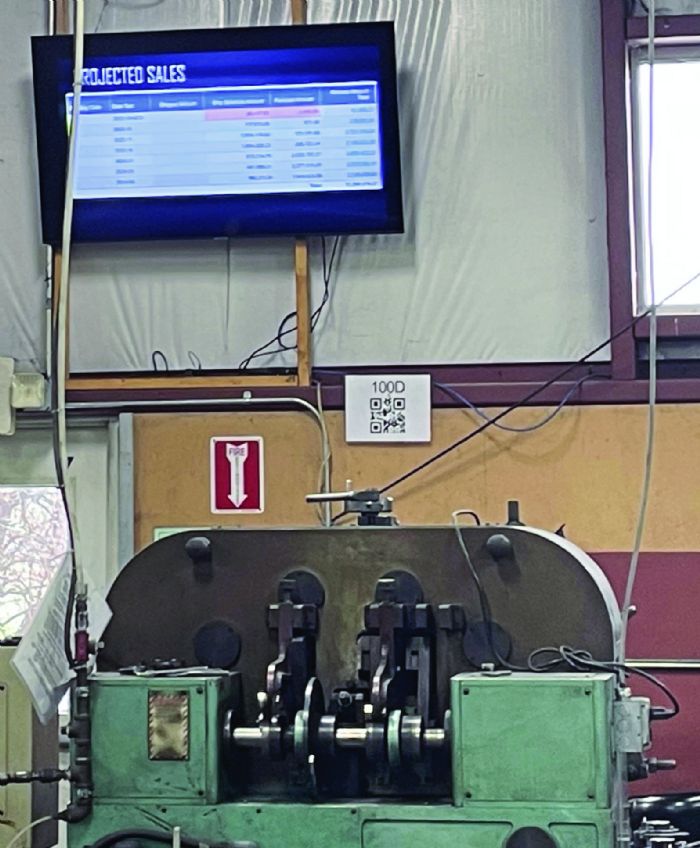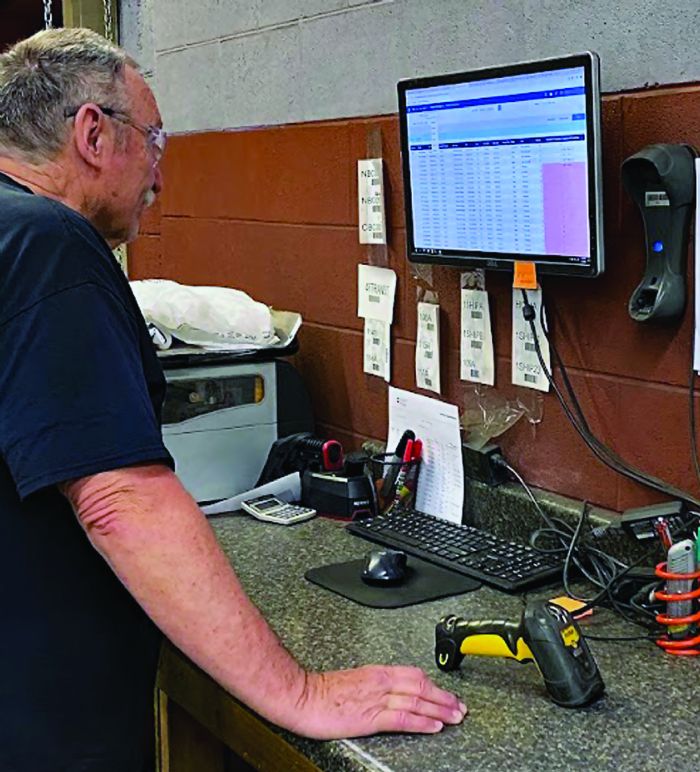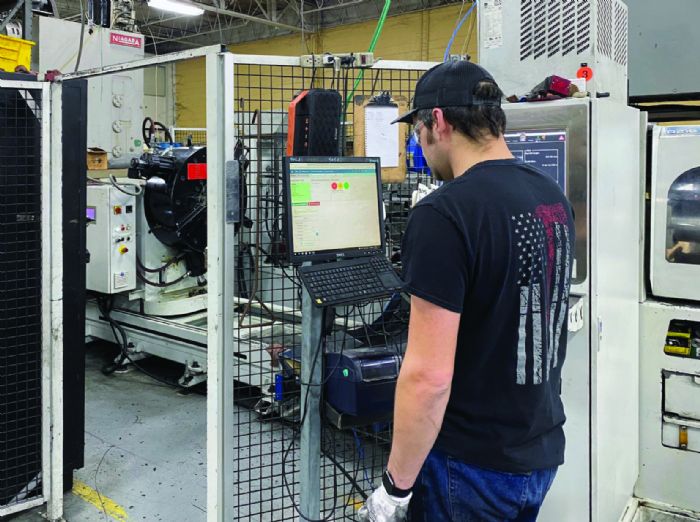Aging, outdated ERP systems can lead to inaccurate quotes, delayed production and shipments, and scattered and inconsistent data, causing potential revenue and margin losses registering in the millions of dollars. That’s according to management-system analysts. Page agrees, and shortly after hiring on at WCS, he led the implementation of a new ERP system, Plex (now Plex, by Rockwell Automation). Since the implementation, which occurred during 2020, Plex ERP has consolidated all of WCS’s applications, provided greater insights into its manufacturing processes, and increased visibility into every facet of operations. One holistic system, Page explains, now serves as “one source of the truth,” providing access to real-time data and enabling the firm to provide customers with up-to-the-minute historical data on their specific projects.
“We’re able to expand operations and adapt with ease, provide accurate quotes and pricing, and simplify our applications,” Page adds.
EDI + MRP + ERP
WCS, established in 1948 and led by third- and fourth-generation ownership, manufactures compression, extension single and double torsion springs, and wireforms, operating from a 55,000-sq.-ft. facility. Wireform capacity is 1/8 to 5/8-in. dia. from soft materials and 1/8 to 0.295-in. dia. from spring steel; spring capacity is 0.010- to 5/8-in. dia. In some cases, parts exit the primary coiling machines and head directly into shipping containers, and in others, production requires secondary operations—grinding, painting or assembly.
“When our operators bring in an order through Plex from the EDI application, the ERP’s materials-requirements planning (MRP) module sets a production schedule and routes the schedule through all of the required processes on the floor,” Page explains. “Each operator records their own production and moves the job to the next operation, based on instructions provided by Plex—the ERP tracks the progression of each order through the shop.”
Operators, in addition to having a Plex terminal at their workstations, also have their own Plex-connected label printers.
“In the past they had to gather their production data at the end of every shift and enter it into the old system,” says Page. “Now they enter the data in real time, and tell us that they can’t imagine life without Plex. And, the operators often suggest ways to make better use of it.”
 Page provides an example: “We’ve always had customer blueprints in a folder on the system that the operators could pull up in Windows at their workstations. Now, at their Plex control panel all they have to do is click a button and the blueprints immediately load onto the terminal with all of the build details. Everything they need to run the job is right there; no searching for information.”
Page provides an example: “We’ve always had customer blueprints in a folder on the system that the operators could pull up in Windows at their workstations. Now, at their Plex control panel all they have to do is click a button and the blueprints immediately load onto the terminal with all of the build details. Everything they need to run the job is right there; no searching for information.”
Prime Production Scheduling
Such precise, accurate tracking allows WCS’ customer-service reps to provide customers with real-time information on their orders. And, more importantly, it allows them visibility into production to adjust the production schedule, if necessary, to accommodate a customer’s request to expedite an order.
“Real-time information at our fingertips and the ability to respond immediately to customers’ change orders is something that we’ve never had before,” Page shares.
He also notes additional benefits realized in the 4 yr. since implementation. Among them: the ability to update estimated production-run times of projects based on real-time data gathered from the floor. “This allows our estimators to provide more accurate quotes, using a historical production record,” Page says. “We’ve also been able to identify some parts that we thought were highly profitable, only to learn that the margins were not as great as we thought, and vice-versa.
“Bottom line, having the data in Plex,” Page continues, “ensures that we quote jobs appropriately, and do not overcharge and lose the work. That makes us much more competitive in the marketplace.”
The firm’s largest customers now also can gauge the productivity of each of WCS’ operations, and also track improvements that the company makes. “We could not provide that visibility before,” Page says, “because we lacked the needed data accuracy that those larger customers were demanding. Now we can tell our customers, with real data, how productive we are and how we’re improving. We can track raw material from when it comes in the door to when it leaves as finished product, and measure how efficiently we handled the material from start to finish.
“A few years ago, our single biggest customer had begun to consider diversifying its supply base,” Page adds. “But instead, it decided to send us even more work, thanks to the added confidence in our processes it gained from the visibility provided by Plex.”
Custom Report Generation
Page relies on the software’s visual reporting tool that enables the team to build custom reports. As an example, he points to a purchasing report the firm customized that automatically updates inventory levels as orders process on the shop floor. This enables purchasing to quickly identify any immediate orders it might need to send through.
“Those reports,” Page shares, “help us optimize our order efficiency with our suppliers, so that we’re ensuring that we get the best available pricing without building excess inventory. The purchasing agents can analyze the reports to see what they might need to bring in over a defined period of time, rather than only seeing what we might need today or tomorrow. This helps us balance pricing and inventory.”
Asked to supply improvements in some of the firm’s key performance indicators, Page notes several. Among them: Month-end closing has been improved by 50%.
“It used to take as long as 2 weeks to close out a month,” he says. “We were always behind. Now we’re closing in 5 days or less, a monumental change. The data flow directly into the reports for the company owners; no more building spreadsheets to run the numbers. This improves cash flow, extremely important for smaller companies such as ours, and helps the owners make better, more-informed decisions.” MF
See also: Plex By Rockwell Automation
Technologies: Management
 “Even with all of the workarounds developed for the old ERP system, it could not reliably meet expectations in areas such as quality, engineering, shipping and electronic data interchange (EDI),” Page says. “And, when customers called with project-specific questions, we struggled to trace the history of projects, and doing so consumed a great deal of time. Things came to a head in 2019 when our owners recognized the need to make a change.”
“Even with all of the workarounds developed for the old ERP system, it could not reliably meet expectations in areas such as quality, engineering, shipping and electronic data interchange (EDI),” Page says. “And, when customers called with project-specific questions, we struggled to trace the history of projects, and doing so consumed a great deal of time. Things came to a head in 2019 when our owners recognized the need to make a change.” That’s the same time period when Page joined WCS, bringing with him vast experience and expertise in ERP implementations. When hired, Page worked to streamline information flow at the company and rid it of many of the add-on applications. But one key hurdle remained: EDI.
That’s the same time period when Page joined WCS, bringing with him vast experience and expertise in ERP implementations. When hired, Page worked to streamline information flow at the company and rid it of many of the add-on applications. But one key hurdle remained: EDI.






 Page provides an example: “We’ve always had customer blueprints in a folder on the system that the operators could pull up in Windows at their workstations. Now, at their Plex control panel all they have to do is click a button and the blueprints immediately load onto the terminal with all of the build details. Everything they need to run the job is right there; no searching for information.”
Page provides an example: “We’ve always had customer blueprints in a folder on the system that the operators could pull up in Windows at their workstations. Now, at their Plex control panel all they have to do is click a button and the blueprints immediately load onto the terminal with all of the build details. Everything they need to run the job is right there; no searching for information.”
